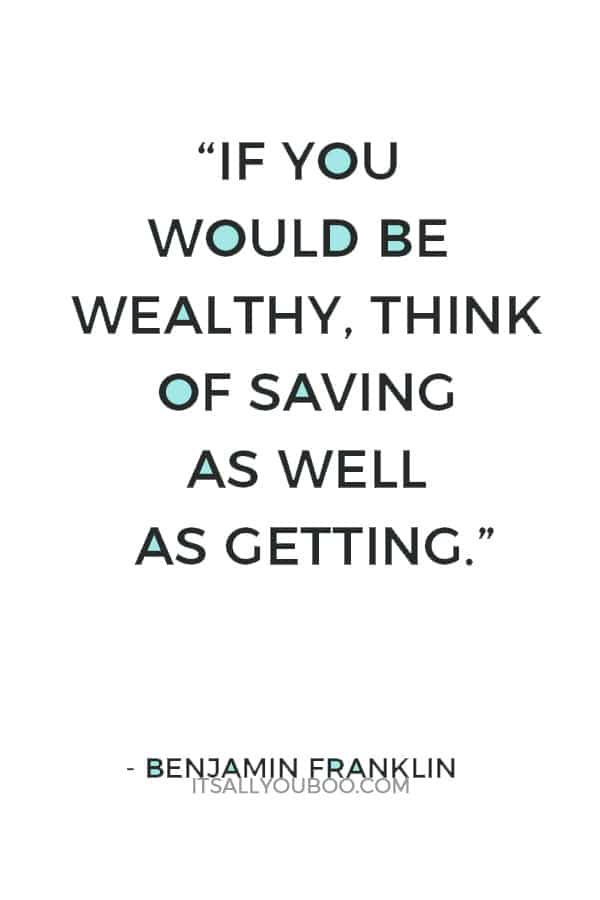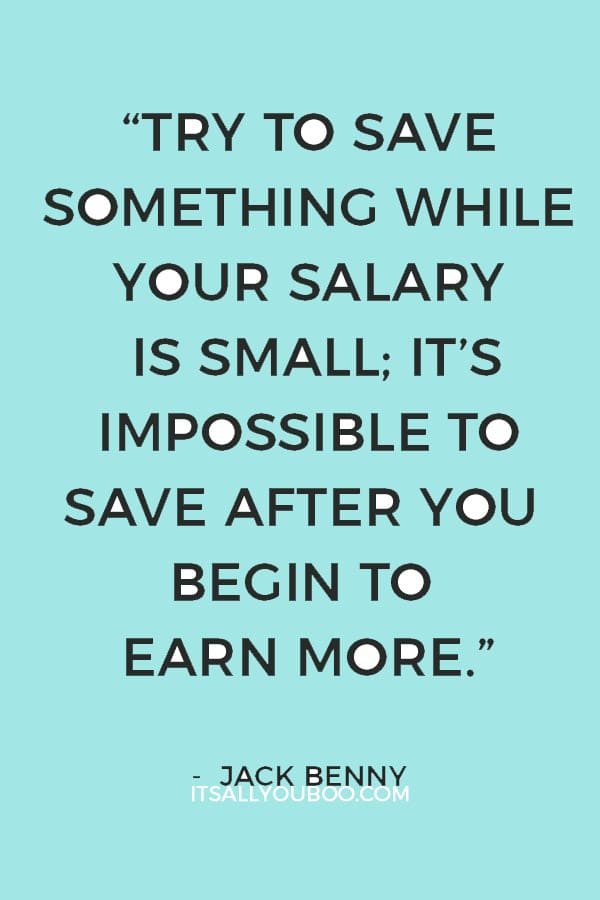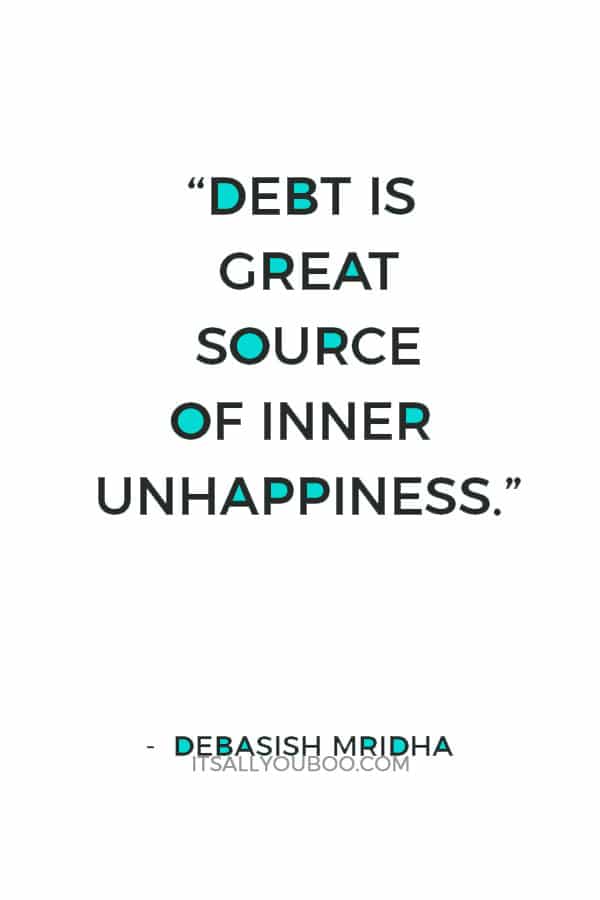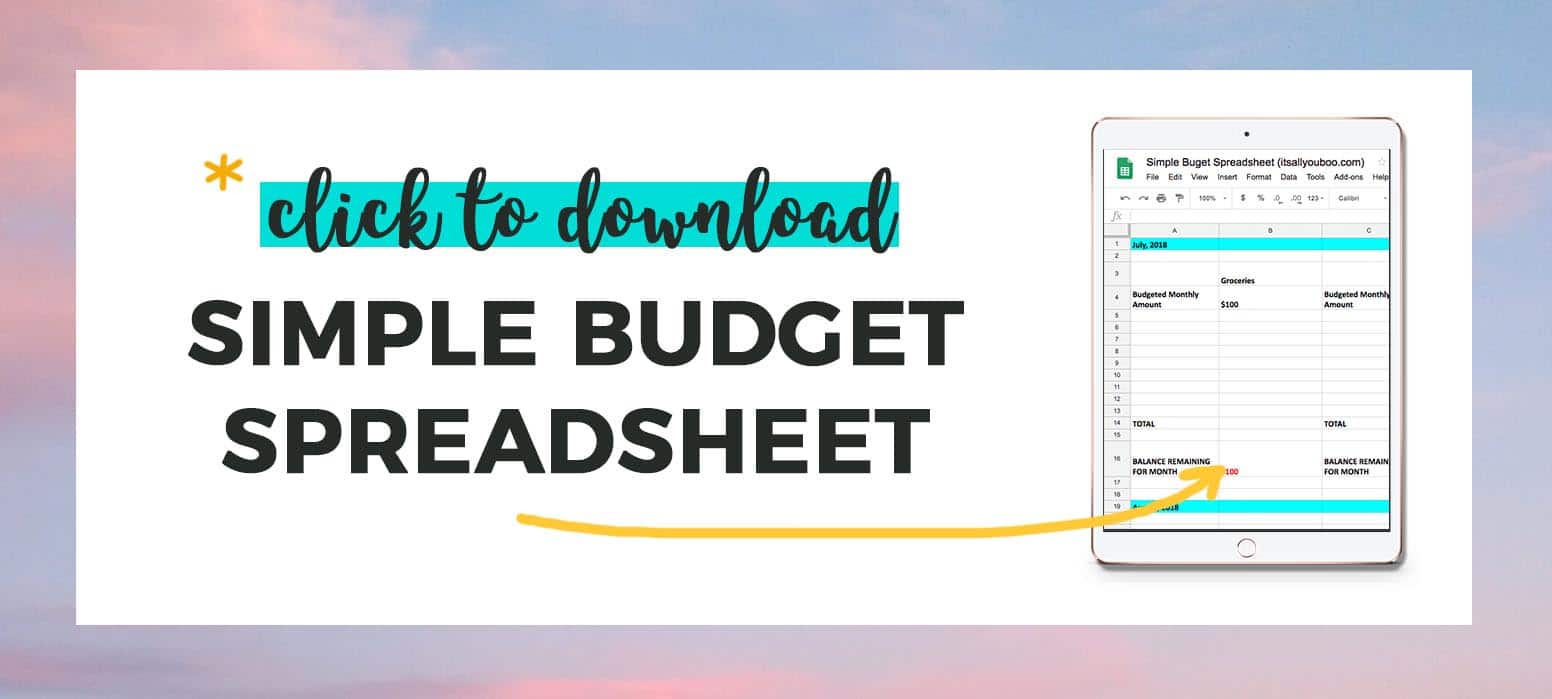Do you want to know, is it better to save money or pay off debt? Should you use your savings to pay off debt or student loans?
Everyone has an opinion about saving money and paying off debt.
Growing up, your parents probably told you to save your money. Then you hit the college scene and that saving was wasted on tuition, books, and parties.
Your last priority was paying off debt because it is likely that the only debt you had at that point was student loans.

The older we get, the more we realize the value of the almighty dollar. When you are just starting out on your own in the world, you soon realize that you have to sometimes make tough choices — rent or groceries?
You may not have grown up with a silver spoon and don’t have two nickels to rub together. When you run into money trouble, you have to figure out what to do. If you’re lucky, you call the family to get some help.
The inevitable call to your family likely went something like this, “I missed my car insurance payment. Can I borrow some money?” Then the typical reprimand and lesson on spending wisely began.
So now, here you are, wondering if you should be saving your money or paying off your debt. Here is the short answer: if your debt is charging you interest, you are losing money. So it is probably more important to pay off debt before starting or adding to a savings account or emergency fund. Let’s break this down farther.
THIS POST MAY CONTAIN AFFILIATE LINKS.
IF YOU MAKE A PURCHASE FROM THESE LINKS, I MAY EARN A SMALL COMMISSION.
CLICK HERE FOR MY FULL DISCLAIMER STATEMENT.
What’s More Important Paying Off Debt or Saving Money?
Whether you save money or pay off debts first depends entirely on your situation. The best choice for you is also determined by what type of debt you’re in, how much interest is being charged as well as how critical those savings are. Let’s discuss the different financial situations you’re in so you can make the right choice for yourself.
👉🏽 RELATED POST: Financial Advice Tips to Get You Through the Crisis
So, what choice will you make for your finance? Is it better to save money or pay off debt, for you? With most Americans in debt, these are questions many of us have.
Debt or Savings Choice #1:
Saving for a House Down Payment
Everyone has an idea of their perfect dream home. That’s great, but maybe it would be more realistic to consider what you can afford, how much you are willing to pay each month, and if your debt will hinder your home purchase. When you meet with a mortgage lender to discuss your options, they will help you consider these things.
👉🏽 RELATED POST: Buying a Home vs. Renting an Apartment
Keep in mind that you don’t have to keep up with the Joneses when buying a home in the first place. It’s not like you win a prize for buying the biggest, most expensive house on the market.
Being house-poor is no fun. If you go into buying with the mentality that smaller is better, then you may not be stuck trying to decide whether to pay off your debt or your mortgage. If you pick a smaller place, then you can make payments on both.
How much do you need to save for a house?
If you want to start saving for a down payment or for buying with cash, there are some things to be mindful of. Keep in mind that a mortgage payment includes more than just your home loan.
Mortgages include taxes, insurance, and maybe even Private Mortgage Insurance (PMI) if you are not able to put down at least 20 percent at purchase. So buying a $250,000 home but only being able to pay a monthly mortgage for a $175,000 home is a bubble-burster.
During the lending process, a huge consideration for being able to purchase is your debt-to-income ratio. If you use most of your monthly paycheck to pay credit card bills, car loans, and student loans, your likelihood of getting approved to purchase is slim.
Even if you are able to afford the monthly rent, that isn’t the same as being able to afford your mortgage.
The answer to funding your dream home purchase is to pay down your debt and then talk to a mortgage lender. Save when you can towards that down payment when you are ready to buy, even if that means you need to cut your spending in other areas of your life in order to save.
👉🏽 RELATED POST: How to Make Money on the Side
Debt or Savings Choice #2:
Using Savings to Pay Off Debt
What are your financial goals? Do you have a plan for your future? If you do, then speaking with a financial advisor can help you to create a plan to achieve your financial goals. That should be your first stop on the journey towards paying off debt.
Your savings can be used to pay off debt, of course, but should you drain your savings account to pay off credit card bills? It depends. You may not want to drain your entire savings account so that you can be prepared for emergencies, but your money isn’t doing you any good sitting in the bank if you are making monthly high-interest payments to credit card companies.
Be smart. The longer you accumulate interest, the longer it will take you to pay off that credit card. So pay down the balance even if you can’t pay it completely off. Always remember, credit cards are charging you interest. Student loans are charging you interest. Car loans are charging you interest. Mortgage payments include interest.
Interest will cost you more money than you are able to save!
Debt or Savings Choice #3:
Paying off Your Mortgage Faster
In a perfect world, the short answer is yes! You should pay off your mortgage because it is costing you money. However, the interest rate isn’t as expensive as credit cards, and there are other ways to pay down your mortgage.
Consider making one extra mortgage payment and put it all towards your principal balance once per year. You must make this specific when sending in the extra payment. According to an amortization calculator, you can cut up to seven years off of your mortgage interest by making a principal payment which is a huge saving.
👉🏽 RELATED POST: 20 Financial Goals Examples
Most homes appreciate in value over time. Your rate on investment with a home is likely higher than your money sitting in your savings account. If you decide to pay off your mortgage early, definitely make sure there isn’t a prepayment penalty first. That can be costly.
Consider putting your money into a retirement plan. Your interest paid through an Index Fund is likely to bring in a higher return than either paying off your home early or letting the cash sit in a savings account drawing little to no interest.
Debt or Savings Choice #3:
Paying off Student Loans ASAP
Here is one that so many of us feel the pain of every month. Those pesky student loans are never-ending and many have little to show for it.
If your student loans have variable rate interest, then the cost of missing a payment is enormous. The cost of making your monthly payments is equally enormous. Student loans can cost as much or more than a monthly mortgage payment.
Start establishing your financial goals early in your college career to prepare for adulting. This will help you navigate your choices regarding the repayment of student loans.
👉🏽 RELATED POST: SMART Financial Goals for College Students
Talk to your student loan lender and ask about early payoff options, fixed-rate options if you don’t have one, and the quickest way to pay them off early. Do your homework. If you can consolidate all of your student loans into one with a decent locked rate, that would help to save you money paid in interest. Plus, dealing with one student loan is much easier than dealing with multiple loans.
Whatever your choice is, don’t make the mistake of leaving yourself hurting for cash. You don’t want to wipe out your savings or emergency fund in the name of paying down debt if that means you can’t pay your other bills or feed your family.
Debt or Savings Choice #4:
Saving Money to Build a Nest Egg
When you have paid down your debt and feel comfortable building your nest egg, continue to live on a budget. The easiest way to save money is to always live like you are in debt even when you aren’t. Make the commitment as a family to live below your means in order to invest money for the future.
For you that might mean you’re no longer living paycheck to paycheque, you’re paying your debts on time and also able to save money. By living below your means you should have a surplus after every paycheck for your nest egg.
👉🏽 RELATED POST: How to Budget with Sinking Funds
When extra money comes, whether you get a raise, promotion, or a tax return, you deposit it into the bank instead of spending it. It’s a great idea to have a savings account separate from your everyday banking account so you’re not tempted to spend it.
Be conservative with your investments until you get some experience. If you have no idea what you are doing when investing, always consult a financial advisor to get advice. You don’t want to lose all your hard-earned savings to the stock market if you’re inexperienced.
Debt or Savings Choice #5:
Investing in Insurance
If you are looking for ways to invest your money and savings, chances are you have considered buying life insurance. Life insurance is generally used as income replacement in the event that you or your loved one passes away. Life insurance can help cover final expenses, lost income, and paying off debt.
There are different kinds of policies, the most popular being term life insurance. Term life policies are the most inexpensive policies but generally don’t accumulate a cash value that you can borrow from.
👉🏽 RELATED POST: How to Makeover Your Money Mindset
Permanent life insurance is a cash-value policy that accumulates funds that the owner of the policy can borrow or cash out to use at retirement. In addition to the cash-value, permanent life insurance policies also have death benefits like term life.
On any life insurance policy, you will identify a beneficiary for the death benefits. For permanent life insurance policies, there is no cash-value payout to the beneficiary.
Investing in life insurance is more of the norm, and it is likely a good investment for your money, especially if you have a family of your own. Consider the insurance payment as a monthly normal monthly expense when budgeting your paycheck.
You can Save and Pay Debt Together
Perhaps you’ve learned from this that there is no one right answer to the question, is it better to save money or pay off debts. It might be similar to choose one over the other, but like all things in life, it’s a balancing act.
Saving money is something on everyone’s mind. Everyone wants a solid savings account, passive income, and a good-paying job. However, not everyone knows how to handle their money responsibly.
Get Your Simple Budget Spreadsheet
With the Simple Budget Spreadsheet, you’ll be able to track your spending and savings. It’s easy to use and compatible with Google Docs and Microsoft Excel. Once you have your budget you can decide, if it’s better to save money or pay off debts.
You need to make wise choices, not just for your savings and debt repayment, but for your spending as well. Just because you qualify for a new credit card doesn’t mean you should have one. Be smart when you are buying with credit or loans.
Don’t get yourself so in debt that you are only working to pay them back. As the famous saying goes, “every dollar saved is worth two earned.”
To avoid answering this question at all for your finances, avoid creating debt in the first place.
That is one of the best financial planning principles to always follow!
What's more important paying off debt or saving money? Should you pay off loans or save first? Click here to get your answer to is it better to save or pay off debt? #Saving #DebtRepayment #FinancialPlanning
So, is it better to save money or pay off debt?

More About Guest Contributor
Robyn Flint writes and researches for the car insurance comparison site, CarInsuranceComparison.com. She is a licensed realtor, a freelance writer, a published author, and an entrepreneur.
Last Updated on July 11, 2023











